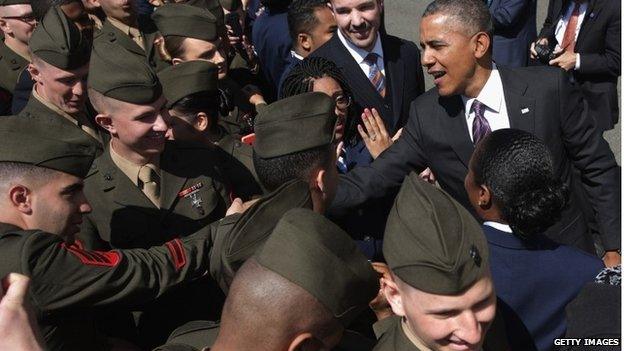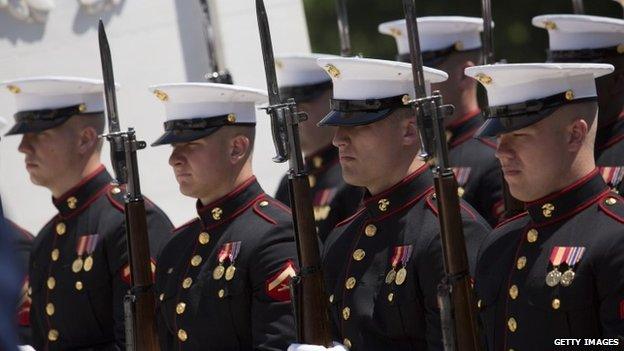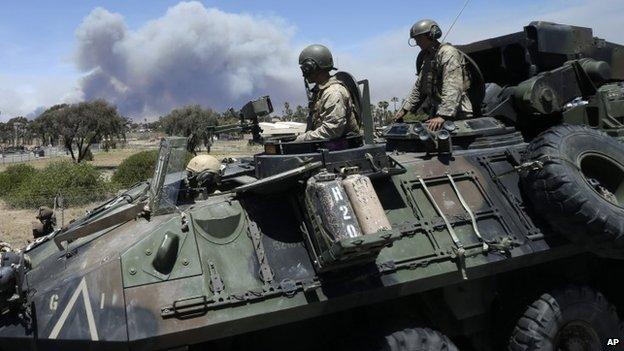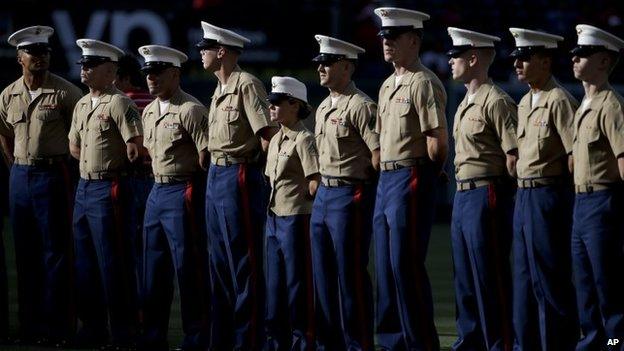Is US foreign policy 'vacuous, vapid and weak'?
- Published
- comments

President Obama is proud of ending America's foreign wars, but there is a growing chorus of criticism of his foreign policy
Under the blazing South Carolina sun on Parris Island, young men and women march in smart formation to the distinct rat-a-tat of the drums and the ump-pah of trombones of a military band.
These are the Marine Corps' newest graduates, the freshest faces in the most powerful fighting force the world has ever known, the United States military.
A disembodied voice from a loudspeaker reminds them they are heirs to past battles in far-flung places.
"From the gritty beaches of the Pacific, to the snow-capped mountains of Korea and the sweltering jungles of Vietnam", marines have served.
Chorus of criticism
Maybe Iraq and Afghanistan are of too recent memory for a snapshot adjective, but they are there at the end of the roll call.

White House officials say that the time is now right for the president to explain how he will project a US that is interventionist and internationalist

Some argue that that the best way of preventing conflict in the world is retaining American power in the world
As the ceremony draws to a close, one marine faints in the heat, falling, heavy as a tree, flat on his face.
It will not be the last injury these young men and women take in the service of their country, but for the first time in 13 years there is a real possibility that none of them will die in combat in a foreign field, gritty, snowy, sweltering or otherwise exotic.
President Obama is proud of ending America's foreign wars, but there is a growing chorus of criticism of a foreign policy that to some looks vapid and weak.
The most senior Republican on the Senate Foreign affairs committee, Bob Corker, tells me there are "questions about the United States that haven't been there in time in the past".
"And I think that creates a vacuum and in that vacuum other people step in," he said.
"I am very concerned about the lack of a clear-sighted foreign policy in our country.
"I will go a little further and say the administration is doing everything they can to skate until 17 January (when the president leaves office) to ensure that nothing, nothing happens on their watch. In essence, sweeping big issues under the rug."
He says that on recent trips abroad - to the Far East and the Middle East, he found the same story - allies who no longer fully trusted the US.

US Marines have served in conflicts across the world
He told me the failure to punish Syrian President Bashar al-Assad when he crossed President Obama's "red lines" by using chemical weapons was a big part of the problem.
"It looks like Assad is cruising to another five years in office," Mr Corker said,
"We validated him by those steps. We could have affected the balance on the ground and we chose not to do that, and I think that was a significant misstep - and what that did was send signals around the world that we really aren't a force to be counted on."
Mr Corker says that has had serious consequences.
"It's that lack of credibility that has send a sense of permissiveness around the world so when you see [Russian President Vladimir] Putin doing the things he's doing, when you see China stepping out and doing the things they're doing, it is because they see a president who, I think, they don't believe will back up statements with actions."
Mr Corker says that he is no warmonger, but sometimes there must be the threat of force to prevent war.
"What I fear is that this president's actions, or lack of actions, on foreign policy actually are creating a very unstable world."
President Obama seems stung by this growing chorus of criticism - he has chosen the graduation ceremony at the prestigious West Point military academy to set out his foreign policy priorities for his remaining time in the White House.
Officials say, rather defensively, that after a year of responding to big events this is the right time for this speech - and he will set out how to engage with the world without over-reaching - how to project a US that is interventionist and internationalist not isolationist or unilateral.
It is tough training on the job, I reflect, while watching a marine at Parris Island stuck halfway up a very tall obstacle course.
I pity poor Mahoney stuck 30ft (9m) off the ground - unable to overcome his fear and move either up or down - perhaps he just has more imagination than his fellows, and knows a fall would shatter every bone in his body.
The president too, may sometimes seem frozen, but is perhaps just very aware of the dire consequence of missteps.
But even those who admire much of what he has done think that this big policy speech is necessary.
One of them is Professor Nick Burns, a former member of the National Security Council with responsibility for Russia under presidents Clinton and Bush senior, then ambassador to Nato and now professor of international relations at Harvard.
Prof Burns says that after a "fairly impressive first term" President Obama has "hit a number of roadblocks".
He talks of the problems in Syria, the Pacific and Ukraine.
"These three incidents have created the impression the United States is not as assertive as it used to be, and probably ought to be."
He thinks the president should use the West Point speech to "plant a flag in the sand" - promise tougher sanctions against Russia, restore spending on defence and diplomacy and call a special Nato summit to reassure members in the East, and send the same signal to allies in the Pacific.
"At a time when Russia and China are clearly being more assertive we need to show our own power," Prof Burns said.
"We don't want conflict but the best way of preventing conflict in the world is retaining American power in the world, which Russia and China will respect if it is visible and led purposefully."
Balancing act
Back on Parris Island, I watch Marines on a narrow walkway batter each other with padded sticks under the tall South Carolina pines, surrounded by those waiting their turn in the fight. From time to time their leaders initiate a screamed call and response.
The combination of a hoarse drill instructor and young marines wearing mouthguards make it hard to work out what they are shouting with such passion - the president's message has been just as indistinct recently.
Over the next 10 days the White House promises a new push to clarify what the president wants to do in the world - and articulating his complex, subtle vision may be hard.
But what is even harder is acting decisively, without resorting to military might - being a defining force in the world without hectoring or bullying.
As these marines might appreciate, some balancing acts are impossible to achieve once you starting thinking about the risks involved.